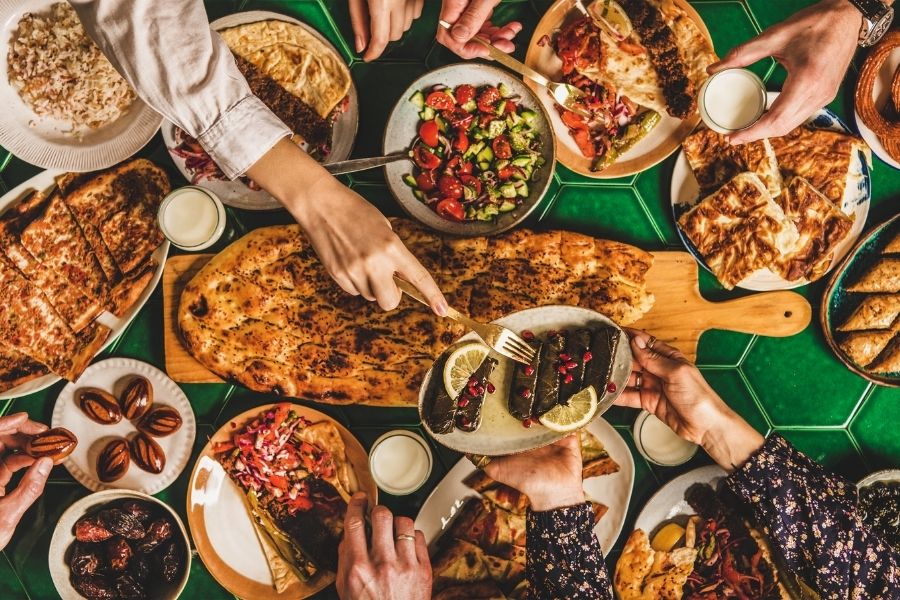Turkey’s food culture is differentiated by the unique characteristics of each region. The Black Sea region’s pilaf with anchovies, the Aegean region’s olive oil dishes, the Southeast region’s spicy kebabs. Each one reveals the diversity and richness of Turkish cuisine.
A Turkish dinner menu is filled with seasonal ingredients and regional dishes. Meals start with meze plates, followed by a main course, usually a meat dish or a choice of olive oil. Meals are usually complemented with yogurt or salad and conclude with dessert.
Turkish cuisine has gained a worldwide reputation for its rich history and cultural diversity. The fertile nature of Anatolian lands, the influence of different cultures and the civilizations it has hosted throughout history have shaped Turkish food culture. Here are the main stops on this delicious journey:
Traditional Dishes of Turkish Cuisine
- Kebabs: Available in different varieties all over Turkey, kebabs are an indispensable part of Turkish cuisine. There are regional differences such as Adana kebab and Urfa kebab.
- Mezes: These small delicacies, mostly made with olive oil, decorate the starter section of Turkish tables. Varieties such as eggplant salad and haydari are the most well-known ones.
- Dolma and Wraps: These dishes, which are made by stuffing vegetables and leaves with rice or minced meat, such as stuffed leaves and stuffed peppers, are especially preferred on special occasions.
- Desserts: Sherbet desserts such as baklava, kadayıf, lokma and milk desserts such as rice pudding and kazandibi represent the sweet side of Turkish cuisine.
Kebabs Indispensable Flavors of Turkish Cuisine
Kebab is one of the most famous dishes of Turkish cuisine and varies according to various regions. The most popular varieties include Adana kebab and Urfa kebab. These kebabs are made from spicy minced meat cooked on special grills at high temperatures and are usually served with spring onions, sumac onions and lavash bread.
Appetizers The Crown Crown of the Table
Turkish cuisine has a wide variety of appetizers and usually consists of vegetable dishes with olive oil. Eggplant salad and haydari are a must-have on the table. Eggplant salad is prepared by blending roasted eggplant with olive oil and lemon, while haydari is prepared with a mixture of yogurt, garlic and spices.
Dolma and Sarma: Traditional Turkish Wrapping Culture
Dolma and sarma can be prepared with olive oil or minced meat. Leaf rolls are made with a mixture of finely chopped minced meat, rice, onion and spices, wrapped in vine leaves. Stuffed peppers are prepared by stuffing bell peppers with the filling and cooking them. Both are indispensable dishes in Turkish cuisine for special occasions and holidays.
Desserts Sorbet and Milk Flavors
The dessert varieties of Turkish cuisine consist of both sherbet and milk desserts. Baklava is a dessert that stands out with the perfect harmony of pistachios and syrup, while kadayif is prepared by placing clotted cream or walnuts between strands of kadayif. Among milk desserts, rice pudding and kazandibi are popular choices; rice pudding is made with rice, milk and sugar, while kazandibi is made by caramelizing the bottom of a custard-like mixture.
Why Should You Try Turkish Cuisine?
Turkish cuisine is as important for health as it is for its flavors. Olive oil dishes, fresh vegetables and spices are the cornerstones of a healthy diet. If you want to get to know Turkish food culture more closely, get ready to discover traditional flavors.
We are waiting for those who want to taste all these flavors of Turkish cuisine and discover new tastes at Deraliye Restaurant in Sultanahmet. Turkish food will enrich not only your taste buds but also your cultural perspective.









